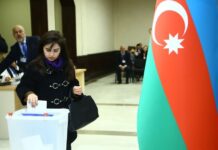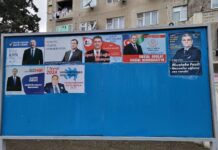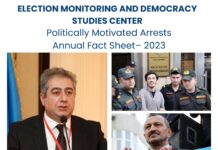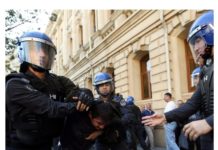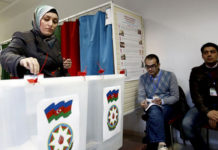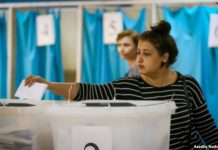The Working Group (WG) on Unified List of Political Prisoners in Azerbaijan presents updated Unified List of Political Prisoners in Azerbaijan.
The update covers the period until 20 February 2019.
Persons recognized as political prisoners based on documents obtained, court observations and interviews, the Working Group has already recognized 127 people as political prisoners; they are:
– 9 journalists and bloggers (Nijat Aliyev, Araz Guliyev, Seymur Hazi, Mehman Huseynov, Fikrat Faramazoglu, Afgan Mukhtarlı, Rashad Ramazanov, Elchin Ismayilli, Ziya Asadli),
– 1 poet (Tofig Hasanli),
– 1 human rights defender (Aliabbas Rustamov),
– 18 civil and political activists (Gozal Bayramli, Fuad Gahramanli, Ilkin Rustamzade, Giyas Ibrahimov, Bayram Mammadov, Elgiz Gahraman, Asif Yusifli, Fuad Ahmadli, Alikram Khurshidov, Orxan Bakhishli, Mirfeyzulla Seyidov, Saleh Rustamov, Vidadi Rustamli, Agil Maharramov, Babak Hasanov, Ruslan Nasirov, Azad Hasanov and Abulfaz Sadigli),
– 67 religious activists (Elkhan Bunyadov, Latif Ahmadov, Anar Aliyev, Sahil Rzayev, Niftali Valiyev, Taleh Baghirzade, Farhad Balayev, Jabbar Jabbarov, Rasim Jabrayilov, Ibrahim Khudaverdiyev, Agil Ismayilov, Etibar Ismayilov, Abbas Guliyev, Ali Nuriyev, Abbas Taghızade, Alibaba Valiyev, Ramin Yarıyev, Abbas Huseynov, Abulfaz Bunyadov, Jahad Babakishizade, Bahruz Askarov, Zakir Mustafayev, Shamil Abdulaliyev, Aga-ali Yahyayev, Elchin Gasimov, Elgun Akhundov, Vusal Alısh, Nahid Gahramanov, Alibey Shahbazov, Amirali Aliyev, Farhad Muradov, Ramil Aliyev, Seyfaddin Shirvanov, Isa Ibrahimov, Seymur Aslanov, Elkhan Isgandarov, Zulfugar Mikhayilov, Ruzi Ismayilov, Jabir Aliyev, Ramil Seyfullayev, Mubariz Ibrahimov, Elman Aghayev, Ali Huseynov, Eldar Bunyatov, Mehman Guliyev, Mehman Mammadov, Elkhan Hasanov, Mahammadali Akhundzade, Faig Allahverdiyev, Ahsan Nuruzade, Sahib Habibov, Aliasgar Jabbarov, Rza Agali, Ziya Tahirov, Khalid Kazımov, Elvin Nasirov, Jeyhun Safarli, Elimkhan Huseynov, Gorkhmaz Jamalov, Dayanat Samadov, Firdovsi Mammadrzayev, Movsum Samadov, Rufulla Akhundzade, Faramiz Abbasov, Abgul Suleymanov, Elnur Javadov, Sardar Babayev),
– 3 life prisoners (Elchin Amiraslanov, Arif Kazimov və Shafa Poladov),
– 14 persons arrested in the relation to social protests (1 person arrested for Ismayilli protests in 2013, 4 persons arrested for Mingachevir protests in 2015, 10 persons arrested for Siyazan protests in 2016: Vasif Ibrahimov, Ilkin Abdullayev, Ilgar Khalilov, Dilgam Mahmudzade, Kamran Abdullayev, Talib Aghamaliyev, Elchin Aliyev, Muslum Azimov, Joshgun Baghishov, Fariz Karimov, Nizami Ganiyev, Namig Mastanov, Zaur Shakarov, Abasat Suleymanov),
– 2 former government officials (Ali Insanov və Rufat Safarov),
– 4 political hostages (Mubariz Abdullayev, Murad Adilov, Elnur Seyidov, Emin Shagiyev),
– 8 persons arrested within the case of Said Dadashbayli and group.
Cases under monitoring
54 cases are under monitoring, as their documents have not been available for studying and informed decision. 51 cases under monitoring are the cases of persons arrested with crackdown following assassination of Ganja city governor and two policemen in July 2018.
The Working Group has substantial suspicion that the law enforcement bodies have followed political motives rather than investigating these crimes and violated number of procedures and fundamental human rights during the arrests and investigative actions:
– the arrests were arbitrary, as the government had not submitted any evidences, that these people have had any links to perpetrators of the assassinations;
– the government alleged that the assassination of Ganja governor on 3 July, 2018 and killing of two police officers during public gathering in the central square of Ganja on 10 July, 2018 were conducted by the organized criminal group, however, no evidence of this allegation had been provided in public statements;
– Internal Security Service, which conducted an investigation and other law enforcement groups have violated rights of presumption of innocence in their public statements directly accusing these people, before their crimes had been proven in the court; Arrested people had been kept incommunicado for 9 days, their family members were not informed of their whereabouts;
– although the government had alleged that the public gathering was an organized riot, the video footage in media does not prove that allegation, and the government does not provide any other proof;
– law enforcement used excessive force during the operations. Six civilians were killed during the operations, without clear evidence of armed resistance to the state forces;
– although the court hearings on the cases are officially public, courts require accreditation, procedure of which is not established by any law. Those who manage to attend the court hearings, are not allowed to take notes even by pen, journalists, identified by court officers have been demanded to leave the courtroom.
Changes in the list after the last update
Since the latest update of the Political Prisoners list by the Working Group on 03 September 2019, 4 persons have been released from custody. Mikayıl İdrisov and Emil Mohbaliyev were released after the end of their arrest term. Mammad Ibrahim and Telman Shiraliyev have been released after spending additional several months after their initial prison term, as new criminal cases had been launched against them just before the end of their prison term. Later, following international and local campaigns, their new prison terms had been shortened, and two political prisoners were released by the Appeal Court rulings.
3 new political prisoners (Azad Hasanov, Emin Sagiyev, Abulfaz Sadigov) had been included to the case.
New criminal cases against political prisoners on the eve of their release
Since the latest update of the List on 01 September 2018, three political prisoners in the penitentiary facility #16 – Telman Shiraliyev, Mammad Ibrahim and Elnur Javadov were charged and sentenced up to 6 months of new prison terms with false charges of storing unauthorised objects in their possessions in prison. Blogger Mehman Huseynov has also faced new charge two months before the end of his arrest sentence. He was accused of attacking the prison officer. If confirmed, he would face up to seven years of new arrest in addition to the rest of his prison term. Following international reactions, solidarity hunger strikes and adoption of Resolution in the European Parliament, the new charges against the blogger had been dropped by the government on 22 January 2019. The resolution of the European Parliament (17 January 2019) also demanded unconditional release of political prisoners, including Mehman Huseynov.
Mammad Ibrahim was released on 13 February 2018, 35 days before the end of the new arrest sentence. Telman Shiraliyev’s new sentence had been reduced by 27 days and he was released on 18 February 2018.
Several other political prisoners, including former health minister Ali Insanov continue to be kept in custody under new criminal cases launched about them on the eve of their release.
Political prisoners left without advocates
The Working Group expresses gratitude to advocates who cooperated with and helped it gather information and documents on political prisoners. But due to intensified pressure and persecution against advocates starting the end of 2017, legal practice of some of them were suspended. On 22 November 2017, Azerbaijan Bar Association (ABA) Presidium requested the court to disbar the advocate, Yalchin Imanov. Until the court decision his legal practice was suspended by the ABA Presidium. By the 22 January 2018 decision of the Presidium, another advocate, Fakhraddin Mehdiyev, by the 23 April 2018 decision of the ABA Asabali Mustafayev and Nemat Karimli were suspended from legal practice for one year term.
The lack of licensed human rights lawyers resulted with the situation when political prisoners were left without representation in the court. Some of political prisoners and those in administrative detention had to write and submit their appeal applications without professional legal assistance. The Working Group has requested the Human Rights Commissioner of the Council of Europe to urge European Court of Human Rights to proceed the human rights cases from Azerbaijan without exhaustion of the local remedies due to the lack of professional independent legal representation in the local courts.
Life prisoners
The Working Group also finds it necessary to clarify the issue with the cases of Life-long prisoners. There are 16 life prisoners who are included in some other lists of political prisoners. One of them died in prison in 2015, twelve others were recognized by CoE experts as non-political prisoners. After long discussions, the Working Group decided to include only three out of 16 life prisoners to the Unified List of Political Prisoners. However, the Group advocates for the change of the punishment to the certain prison term for all life-long prisoners.
Number of persons arrested on politically-motivated charges are higher than those in the list
The Working Group regretfully states, that the real number of political prisoners in Azerbaijan is much higher than could be reflected in the document as many cases are under-reported due to the fear of further repression. Another problem is lack of legal education, defense lawyers, who agree to undertake political cases and lack of defence mechanisms, especially in rural regions of Azerbaijan.
Discussions on political prisoner problem in Council of Europe (CoE)
On 24 April 2018, 24 deputies of PACE under Pieter Omtzigt’s leadership, the MP from Netherlands, requested to prepare new report on political prisoners in Azerbaijan and appoint a new rapporteur. They reasoned their request that there were strong corruption allegations raising doubts on failure of being adopted the 2013 report on political prisoners presented by Christoph Strasser, the MP and rapporteur on political prisoners in Azerbaijan. As a ground for the doubts they referred to the Report of the Independent Investigation Body on the allegations of corruption within the Parliamentary Assembly. PACE Procedure Committee imposed a sanction against 4 MPs mentioned in the report – Pedro Argamunt (Spain) for 10 years and Samad Seyidov (head of delegation of Azerbaijan to Council of Europe), Sezar Florin Preda (Romania) and Jordi Xucla (Spain) for two years. During these terms, they were deprived of some rights including being rapporteur, standing for key positions, observing elections.
On 31 May 2018, PACE Bureau adopted the request of MPs group led by Pieter Omtzig. On June 2018, Legal and Human Rights Committee of PACE appointed Thorhildur Sunna Evarsdottir, the MP from Iceland, as a rapporteur on political prisoners in Azerbaijan. She has to prepare a new report on political prisoners of Azerbaijan.
On 22 January 2019, the rapporteur had submitted memorandum to the Legal Affairc Committee of the Parliamentary Assembly. The report refers to the Unified List of Political Prisoners in Azerbaijan, prepared by this Working Group1. The Working Group is ready to
submit any supporting documentation to the rapporteur or other international bodies who work on the issue of political prisoners in Azerbaijan.
Brief information about the Unified List of Political Prisoners in Azerbaijan
The goal of preparing the Unified List of Political Prisoners is to define the common position on people whose arrests were politically motivated, consolidate the efforts for their release in the country and internationally.
The Updated List is a result of the research based on information and documents obtained by the WG members, or submitted to the Group, court observations and trustworthy media reports.
Decision on recognition as political prisoner is based on criteria defined in the October 3, 2012 Resolution #1900 of the Parliamentary Assembly of the Council of Europe:
“A person deprived of his or her personal liberty is to be regarded as a ‘political prisoner’:
a. if the detention has been imposed in violation of one of the fundamental guarantees set out in the European Convention on Human Rights and its Protocols (ECHR), in particular freedom of thought, conscience and religion, freedom of expression and information, freedom of assembly and association;
b. if the detention has been imposed for purely political reasons without connection to any offence;
c. if, for political motives, the length of the detention or its conditions are clearly out of proportion to the offence the person has been found guilty of or is suspected of;
d. if, for political motives, he or she is detained in a discriminatory manner as compared to other persons; or,
e. if the detention is the result of proceedings which were clearly unfair and it appears to be connected with political motives of the authorities.”
The decision on recognition of the case as politically motivated followed long discussions on the matters and documents. When the political motivation was obviously seen in the court decisions on detention, statements of the law-enforcement agencies and the country leadership, The Working Group have regarded the case as political prisoner, without waiting for a trial hearing on the case.
The list is signed by famous human rights defenders, media, NGO and other representatives of the Civil Society.
Coordinators of the Working Group can be contacted via email:
Intigam Aliyev: intigamaliyev@yahoo.com
Khadija Ismayilova: khadijaismayilova2@gmail.com
The Working Group
on Unified List Of Political Prisoners






